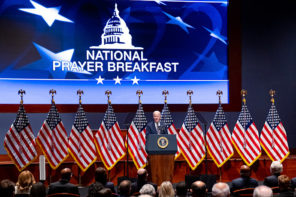As I wrote in the wee hours of the morning, last night’s election results show that we’re undergoing a great religious realignment, one in which “nones” share an equal proportion of the electorate with evangelicals, one in which “nones” helped drive President Obama to a reelection victory, one in which an increasing number of “nones” are non-believers, yet one in which white religious conservatives remain the essential bulk of the Republican base.
The morning after an election always brings lists of winners and losers, and here are some losers: people or entities who tried to use their power or money to advance their religious agenda, often one not only out of step with most voters, but even the religious demographic they claimed to represent. From the Forward: “Tough night for Sheldon Adelson.” From Eduardo Penalver at Commonweal, on the Catholic hierarchy, which “finds itself identified more closely than ever with a single party in the United States, a party that is on the wrong side of inexorable demographic change.” I’ll add my own: Senate candidates Richard Mourdock and Todd Akin, and Rick Berg, who voted in North Dakota’s state legislature to make getting an abortion a felony. Mitt Romney, who endorsed Mourdock and Berg. Representative Allen West and his Islamophobia. Paul Ryan, who hitched his wagon to Ralph Reed and warned voters in the waning days of the campaign that Obama threatens “Judeo-Christian values.” The IRS, for not enforcing its own rule against politicking in the pulpit. The “pulpit freedom” pastors.
It was just about a year ago that the U.S. Conference of Catholic Bishops launched its “religious freedom” campaign in earnest. Cloaked in hyperbolic language about loss of religious liberty, it was really about the contraception mandate and gay marriage. What do they have to show for it? A record 19 women (update: now 20) in the Senate. Marriage equality in four states. As Catholics for Choice president Jon O’Brien said in October, about a poll showing large marjorities of Catholics rejecting the bishops’ politicking in the pulpit, “the bishops are trying to bully Catholics to vote in a certain way. This poll shows that the bishops’ efforts have been a spectacular failure.”
I’d anticipate some doubling down by the religious right in the “religious freedom” wars in the wake of Obama’s victory. But last night’s results show exactly why Democrats have a huge opportunity to make a counter-argument on religious freedom: that secular government and secular campaigning ensure everyone’s religious freedom, by not giving one religious view (often expressed by religious “leaders” but not necessarily shared by their constituents) precedence over another. The Constitution guarantees both a religiously neutral government and religious freedom; one is tied to the other. When the government, and politicians, are neutral on religion, everyone’s religious freedom is protected. This is an approach, and an argument, that meshes perfectly with Obama’s religiously diverse coalition. It’s one that the Romney coalition is at loggerheads with, because it seeks to impose its religious views (so-called “Judeo-Christian values”) on everyone else.
Jacques Berlinerblau blames the secularism movement for lack of effective leadership. But the political parties share blame here too. The GOP for its pact with the religious right, which makes it beholden to its refusal to adapt or compromise and unable to attract any other voters as a result. The Democrats, for lack of imagination in responding to the GOP’s supposed dominance over “religious” voters and fear of talking about church-state separation. The Democrats for buying the claim that voters want to hear about politicians’ religiosity, that voters want to hear about how faith informs policy, and that voters want politicians to listen to religious “leaders” (i.e., those with access and power) and adapt policies to suit them, even if it harms other citizens. (Case in point, the contraception coverage requirement.) But what happens when, as in the case of the bishops, their constituents disagree with the religious leaders who have lobbyists, and access to the White House and Congress?
While the Democrats did have a modest infrastructure for religious outreach this year (see the close of this piece for some of the details), Obama engaged in far less (although a bit) of religious politicking. Mostly he relied on surrogates to tout his religiosity to the press, in particular an evangelical style of Christianity. This was a much more modest redux of the strategy for 2008, but it was obvious neither the president’s nor the campaign’s hearts were in it. And maybe that’s a sign that they, too, are ready for a change.




